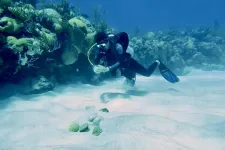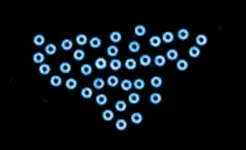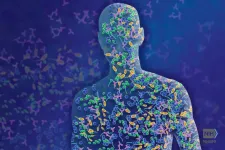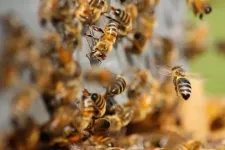(Press-News.org) Adult corals that survive high-intensity environmental stresses, such as bleaching events, can produce offspring that are better suited to survive in new environments. These results from a series of experiments conducted at the Bermuda Institute of Ocean Sciences (BIOS) in 2017 and 2018 are deepening scientists' understanding of how the gradual increase of sea surface temperatures and other environmental disturbances may influence future coral generations.
Researchers on the project included BIOS marine ecologists Samantha de Putron and Gretchen Goodbody-Gringley (now with the Central Caribbean Marine Institute), ecophysiologist Hollie Putnam at the University of Rhode Island (URI), and Kevin Wong, then a first-year doctoral student at URI. Primary funding came from the Heising-Simons Foundation International, Ltd. with additional funding from the National Geographic Society and the Canadian Associates of BIOS (CABIOS).
The team spent last year working the data into a manuscript, which was published this month in the journal Global Change Biology and listed Wong as the first author. Wong, now nearing the end of his fourth year of studies at URI under the mentorship of Putnam, plans to graduate in May 2022.
"We know parental history influences the characteristics of offspring in corals, however the experimental design used in this study provides us with a unique perspective on how multiple types of thermal events can accumulate over time and have lasting consequences across generations," Wong said.
Coral Collection and Study
The multi-year field and lab-based study began in the summer of 2017. Departing from BIOS on a small boat with diving gear, the team collected 40 adult Porites astreoides (mustard hill) corals from two different reef sites northwest of Bermuda: a patch reef (Crescent Reef), which is located in a shallower lagoon environment, and a rim reef (Hog Reef) which is a barrier reef more exposed to open ocean conditions.
They next placed the live corals in the then newly-constructed BIOS mesocosm facility, where large outdoor aquaria "flow-through" seawater systems allowed researchers to control and adjust water temperature in the tanks for completing the study.
A variety of baseline data were collected on the corals in each colony, such as metabolic rates and the density of Symbiodinaceae, the symbiotic algae that live within the coral tissues. To simulate a thermal stress event, the adult corals were exposed to two different temperature treatments--ambient (84°F or 29°C) or heated (88°F or 31°C)--for a period of 21 days over their reproductive period. Afterward, the team assessed the physiology of the adult corals, looking at key functions such as respiration and photosynthetic rates. They also monitored the release of coral larvae and assessed its physiology, measuring the larval size and density of Symbiodinaceae within each larva, among other factors.
Upon completion of the experiment, the adult corals were divided in half and reciprocally transplanted, with half of the fragments positioned in the new environments and half returned to their originating environments. All of the fragments remained in place until the summer of 2018, when they were re-collected, and the physiologies of both adult corals and coral larvae were assessed in the same manner as in 2017.
A Stronger Coral Generation
The results of this two-year investigation showed that adult corals that experienced the thermal stress event produced offspring more capable of thriving in their current environment. This means that parent corals that experience stressors may be able to "pre-condition" their offspring to survive in new environments in the following year. The results also indicate that high-intensity environmental stress events, such as bleaching, can have lasting impacts on adult colonies and how they produce their offspring.
"The coral used in this study is a notoriously resilient coral and these findings potentially demonstrate how this species is so persistent across the Caribbean," Putnam said. "Not all coral species are this robust to environmental stressors. However, this system allows us to unravel the mechanisms leading to resilience and identify which corals are most sensitive to climate change."
Long-time Member of BIOS Community
Wong, 27, is a familiar face at BIOS, having first arrived on campus in the summer of 2014 as a CABIOS intern when he spent 12 weeks working with de Putron on a research project investigating the role of temperature and light on the growth and survivorship of juvenile mustard hill corals from two different reef zones. The following year, he received CABIOS funding to work with then-faculty member Gretchen Goodbody-Gringley on a project focused on the reproductive ecology of corals from mesophotic reef ecosystems, deeper-water reefs which typically extend from 100 to almost 500 feet (30 to 150 meters) in depth.
While presenting the results of his research at the 2016 International Coral Reef Symposium meeting in Hawaii, he had the opportunity to interview with Putnam for URI's Biological and Environmental Sciences doctoral program. Wong then returned to BIOS to spend six months in 2016 as a teaching assistant for several summer and fall courses. He also received BIOS Grants-in-Aid funding for a research project with Goodbody-Gringley and de Putron focused on the reproductive ecology of mustard hill coral from various reef sites around Bermuda, resulting in a publication in the journal Coral Reefs.
"It is wonderful to see an undergraduate intern progress to a successful graduate student who is publishing manuscripts," de Putron said. "Many years of hard work and plenty of exhausting, yet fun, days in the field and laboratory all culminated in interesting and critically relevant discoveries that further our understanding of coral resilience."
Now, a year from graduation, Wong is diving deeper into the mechanisms that drive environmental memory within and across coral generations at a molecular level. By using approaches such as metabolomics (the identification and quantification of metabolic by-products), transcriptomics (quantification of gene expression), and epigenetics (features that regulate gene expression), Wong aims to determine the key linkages between metabolism and coral bleaching phenotypes at a cellular level.
INFORMATION:
WACO, Texas (June 23, 2021) - When an organization supports its employees who choose to adopt children, the employees, their families, the adopted children and the organization itself experience positive benefits and outcomes, according to new research from Baylor University.
The study, "It Takes a Village: How Organizational Support for Adoption Positively Affects Employees and Their Families," is published in the Journal of Occupational and Organizational Psychology. Researchers from Baylor's Hankamer School of Business include Matthew J. Quade, Ph.D., associate professor of management; ...
FOR IMMEDIATE RELEASE
STUDY SUGGESTS THAT SMOOTHER SILICONE BREAST IMPLANTS REDUCE SEVERITY OF IMMUNE SYSTEM REACTIONS
According to researchers at Johns Hopkins Medicine, the Massachusetts Institute of Technology (MIT) and Rice University in Houston, silicone breast implants with a smoother surface design have less risk of producing inflammation and other immune system reactions than those with more roughly textured coatings. Results of the experiments using mice, rabbits and samples of human breast tissue advance knowledge of how the body responds to such implants, providing new information to physicians and affirming ...
PHILADELPHIA - Researchers have been investigating the potential health-promoting qualities of extra virgin olive oil (EVOO) for decades, including its possible medicinal value for preventing cancer, Alzheimer's, and cardiovascular disease, as part of the well-known Mediterranean diet. However, consumers in the U.S. have been slow to embrace it as a staple in their diet. This reluctance, say scientists, might be in part due to EVOO's bitter taste and pungency, which is caused by the presence of substances known as phenolic compounds, the very ones believed to contribute to EVOO health benefits. In 2005, researchers from the Monell Chemical ...
Microscopy is an essential tool in many fields of science and medicine. However, many groups have limited access to this technology due to its cost and fragility. Now, researchers from the Universities of Göttingen and Münster have succeeded in building a high-resolution microscope using nothing more than children's plastic building bricks and affordable parts from a mobile phone. They then went on to show that children aged 9-13 had significantly increased understanding of microscopy after constructing and working with the LEGO® microscope. Their results were published in The Biophysicist.
The researchers designed ...
New York, NY--June 23, 2021--A challenging frontier in science and engineering is controlling matter outside of thermodynamic equilibrium to build material systems with capabilities that rival those of living organisms. Research on active colloids aims to create micro- and nanoscale "particles" that swim through viscous fluids like primitive microorganisms. When these self-propelled particles come together, they can organize and move like schools of fish to perform robotic functions, such as navigating complex environments and delivering "cargo" to targeted locations.
A Columbia Engineering team led by Kyle Bishop, professor of chemical engineering, is at the forefront of studying and designing the dynamics of active colloids powered by chemical reactions ...
A new study published in Nature Communications finds that piles of sand grains, even when undisturbed, are in constant motion. Using highly-sensitive optical interference data, researchers from the University of Pennsylvania and Vanderbilt University present results that challenge existing theories in both geology and physics about how soils and other types of disordered materials behave.
Most people only become aware of soil movement on hillsides when soil suddenly loses its rigidity, a phenomenon known as yield. "Say that you have soil on a hillside. Then, if there's an earthquake or it rains, this material that's apparently ...
WHAT:
National Institutes of Health scientists and their collaborators have identified an internal communication network in mammals that may regulate tissue repair and inflammation, providing new insights on how diseases such as obesity and inflammatory skin disorders develop. The new research is published in Cell.
The billions of organisms living on body surfaces such as the skin of mammals--collectively called microbiota--communicate with each other and the host immune system in a sophisticated network. According to the study, viruses integrated in the host genome, remnants of previous infections called endogenous retroviruses, can control how the host immune system and the microbiota ...
Beekeepers across the United States lost 45.5% of their managed honey bee colonies from April 2020 to April 2021, according to preliminary results of the 15th annual nationwide survey conducted by the nonprofit Bee Informed Partnership (BIP). These losses mark the second highest loss rate the survey has recorded since it began in 2006 (6.1 percentage points higher than the average annual loss rate of 39.4%). The survey results highlight the continuing high rates of honey bee colony turnover. The high loss rate was driven by both elevated summer and winter losses this year, with no clear progression toward improvement ...
Those with power, such as the wealthy are more likely to blame others for having shortcomings and they are also less troubled by reports of inequality, according to recent research from the University of California San Diego's Rady School of Management.
The study published in END ...
BROOKLYN, New York, Wednesday, June 23, 2021 -- Owing to their tunable properties, hydrogels comprising stimuli-sensitive polymers are among the most appealing molecular scaffolds because their versatility allows for applications in tissue engineering, drug delivery and other biomedical fields.
Peptides and proteins are increasingly popular as building blocks because they can be stimulated to self-assemble into nanostructures such as nanoparticles or nanofibers, which enables gelation -- the formation of supramolecular hydrogels that can trap water and small molecules. Engineers, to generate such smart biomaterials, are developing systems that can respond to a multitude of stimuli including heat. Although thermosensitive hydrogels are among widely ...





